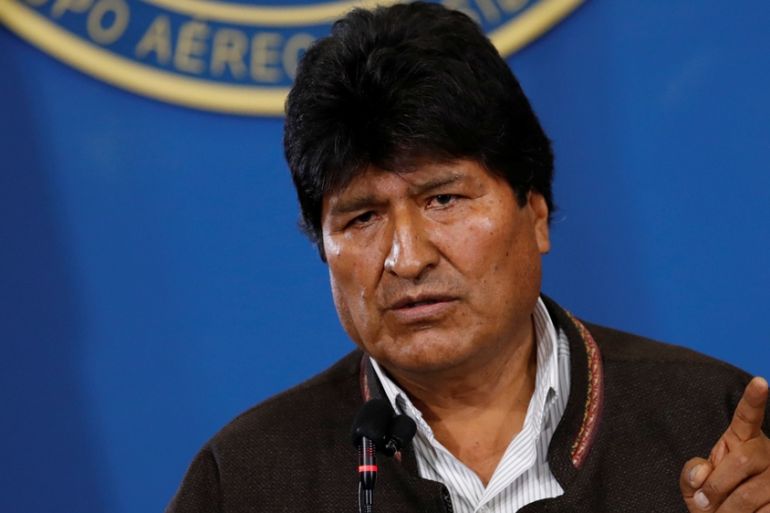Evo Morales leaves Bolivia for Mexico amid violent unrest
Morales leaves a country struggling to fill a power vacuum after resigning in the wake of a disputed election.

Former Bolivian President Evo Morales tweeted late on Monday night that he was leaving Bolivia for Mexico, which granted him asylum, as his supporters and their rivals clashed on the streets of La Paz.
Morales announced his departure on Twitter just after 9.30pm (01:30 GMT).
Keep reading
list of 3 itemsEvo Morales steps down: Reaction from Latin America and beyond
Political vacuum in Bolivia as Morales announces resignation
“It hurts to leave the country for political reasons, but I will stay in touch,” he wrote.
“Soon I will return with more strength and energy.”
|
|
Morales stepped down on Sunday following weeks of protests over a disputed presidential election, but the ensuing resignations of every constitutionally-designated successor have left it unclear who will take his place and how.
Angry supporters of the socialist leader set barricades ablaze to block some roads leading to the country’s main airport, while his foes blocked most of the streets leading to the capital’s main square in front of Congress and the presidential palace.
Police urged residents of La Paz to stay in their homes and said they were joining forces with the army to avoid an escalation of the violence.
Mexico granted asylum to Morales on Monday as unrest deepened, helping cement the Mexican government’s emerging role as a bastion of diplomatic support for left-wing leaders in Latin America.
Foreign Minister Marcelo Ebrard said the decision to grant him asylum reflected the country’s long tradition of sheltering exiles.
The country’s top diplomat confirmed in the early hours of Tuesday that Morales’ plane had taken off and that the former Bolivian leader was under Mexico’s protection.
“His life and integrity are safe,” Ebrard said.
Looting and roadblocks convulsed Bolivia after Morales stepped down, and he said “violent groups” attacked his house.
The former president shared on Twitter the makeshift bed where he said he spent his first night after his resignation, which he described as a “coup” that had been orchestrated by his rivals and the police.
Así fue mi primera noche después de dejar la presidencia forzado por el golpe de Mesa y Camacho con ayuda de la Policía. Así recordé tiempos de dirigente. Muy agradecido con mis hermanos de las federaciones del Trópico de Cochabamba por brindarnos seguridad y cuidado. pic.twitter.com/O1EpDhS5Qw
— Evo Morales Ayma (@evoespueblo) November 12, 2019
The departure of Bolivia’s first indigenous president, one of a wave of left-wing leaders who dominated Latin America’s politics at the start of the century comes amid widespread rejection of incumbent leaders from both sides of the political divide in the region from Mexico to Brazil and Argentina.
Mexico elected its first left-leaning government in decades last year.
Argentina last month elected a left-leaning leader, as voters rejected economic policies that were supposed to stabilise the economy but deepened poverty and inflation.
Ebrard said earlier on Monday his government viewed Sunday’s events in Bolivia as a “coup” because the military broke with the constitutional order by pressing Morales to resign.
Mexican President Andres Manuel Lopez Obrador praised Morales saying he had chosen to resign rather than put the lives of Bolivia’s citizens at risk.
Bolivia went to the polls on October 20. The Washington-based Organization of American States delivered a report on Sunday citing serious irregularities during the vote.